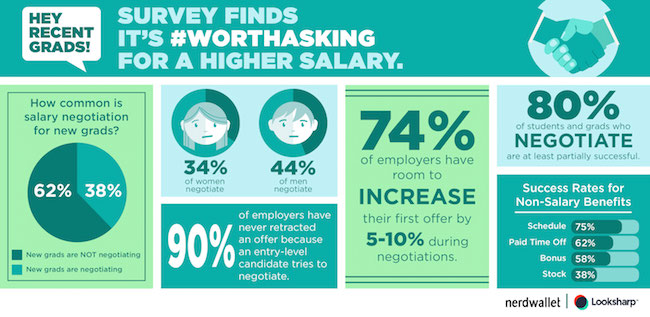Among majors, computer science graduates were the most likely to negotiate at 47.3 percent. They were followed by graduates who majored in engineering (43.7 percent), the arts (42.6 percent), biological and physical sciences (38.6 percent), and business (38.6).
When it comes to results, biological and physical sciences topped the list, a testament to supply and demand. Here, 33.7 percent of graduates were completely successful and 50.6 were partially successful in negotiating their first base salary. Arts majors, long known for their expressiveness, finished second with 80.4 percent being either completely or partially satisfied with their results (with arts majors being the most likely to be “completely successful” among all majors at 37.2 percent). While computer science majors were the most apt to negotiate, 20.6 were “unsuccessful” in their negotiations, a dubious honor only surpassed by social science and liberal arts (22 percent) and engineering (28.5 percent) majors.
Among business majors, 29.2 percent were “completely successful” and 50.5 percent were partially successful in negotiating their base salary. However, over 20 percent were “unsuccessful” in getting anything extra beyond the initial offer.
WOMEN EARN MORE WHEN THEY ARE WILLING TO NEGOTIATE
Among graduates, women were much less likely to negotiate than men. According to NerdWallet, 66.2 percent of women chose not to negotiate after an offer was made, over 15 percent higher than men (51.1 percent). Compared to men, entry level women were less likely to feel confident (36.6 percent vs. 52.8 percent) and more likely to feel anxious (42.2 percent vs. 27.6 percent) when it came to negotiation. In addition, women felt slightly less prepared to negotiate than men (14.3 percent vs. 11 percent).
Such numbers are one factor why women earn 77 cents on the dollar compared to men. By being less willing to negotiate, they concede higher compensation early on to their more confident male counterparts. For example, NerdWallet notes that women were more likely to expect starting salaries from $25,000 and $44,999. At the same time, men were more likely to peg their value between $45,000 to more than $75,000.
However, when women choose to negotiate salary and benefits, they sometimes got better results than their male counterparts. Take base salary, for instance. Here, 33.9 percent of women were “completely successful” in getting higher compensation. In contrast, 29.4 percent of men achieved the same result. If you factor in a “partially successful” result, nearly 80 percent of women earned more money than they normally would’ve received. Similarly, 49.3 percent of women were “completely” successful when negotiating their schedule. Again that number rises to nearly 80 percent when “partially successful” outcomes are included – nearly 10 percent higher than men.
However, entry level women, as a whole, were less successful in big ticket perks like bonus and stock options. For bonuses, barely 50 percent of women notched a completely or partially successful result when they negotiate (compared to 63.5 percent of men). With stocks, just 8.2 percent were “completely successful” in negotiating better holdings, nearly half that of men at 15.4 percent. And the numbers gets worse when “partially successful” results are included (44.2 percent for men against 31.6 percent for women). While women were more likely to be “completely successful” in negotiating paid time off than men (29.8 percent vs. 26.3 percent), that number falls into men’s favor when “partially successful” negotiations are added (60.3 percent vs. 65.1 percent for men).
DON’T MISS: NEGOTIATION DO’S AND DON’TS














Questions about this article? Email us or leave a comment below.